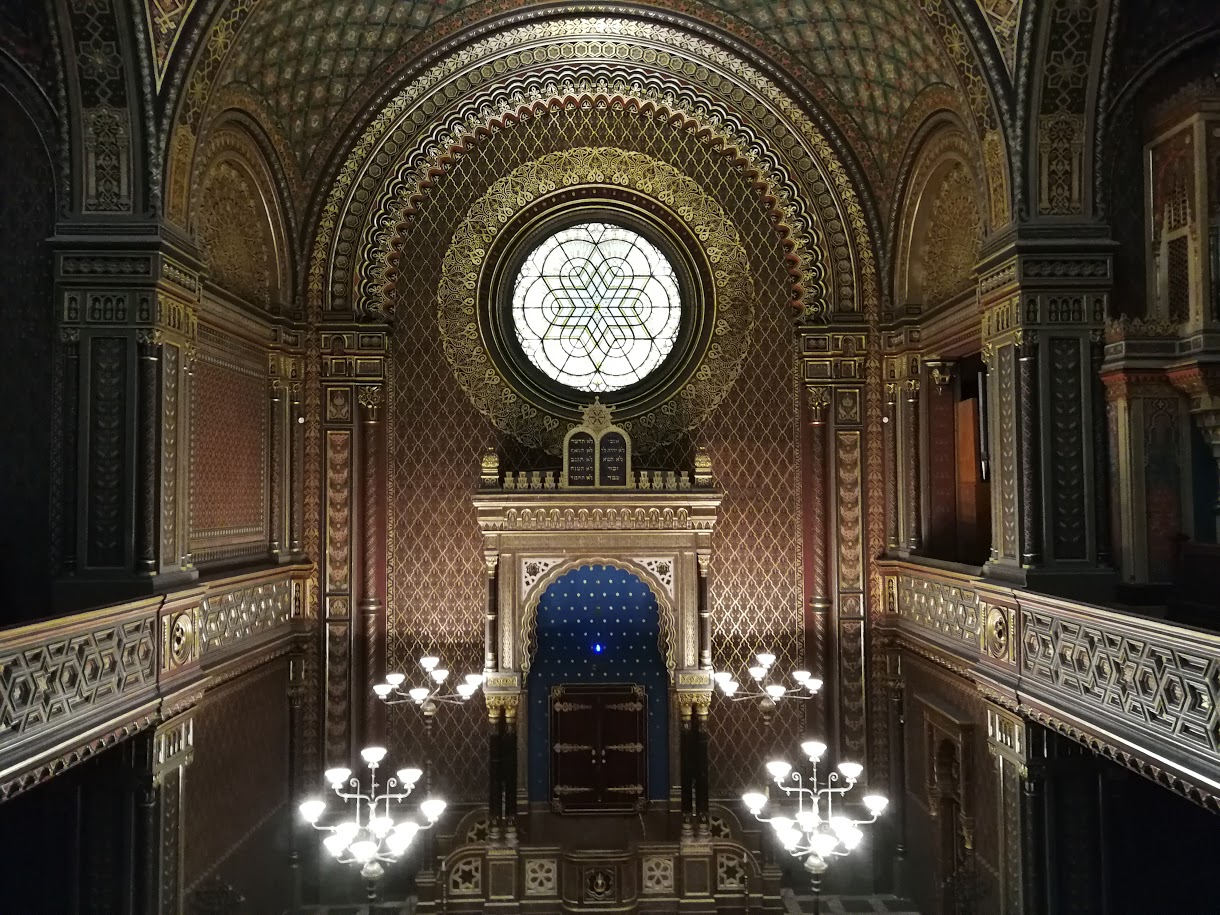It was a few years ago in my music class that I first heard a Yiddish song. That was the first and the only time that I ever learned something about the Jewish culture in school. One song. One song for a culture that was more present than any other minority group in my country throughout the entirety of its history. One song for a group that brought up some of the greatest minds who we nowadays see as our grand personalities: Einstein, Heine, Marx, Liebermann, Mendelssohn Bartholdy, Freud, Kafka, Luxemburg, Bloch, Mahler, Döblin and many others. One song for an abundance of traditions, paintings, books, songs, poems, monuments, customs, works and most importantly lives.
How can you look at a group of people, a highly developed culture, one that brought as a lot of inventions and works of art and only acknowledge its death? How? How can you acknowledge somebody’s life by only knowing about his death? It is not possible. What we have here, is a denial of life. We deny the lives of millions by just ignoring them. And no, this is not a small culture in Eastern Asia or South America, which only marginally affected our culture, so we do not have to learn about it in our history classes. This argument is invalid here. Therefore, I want you to ask yourself: What do I know about the Jewish culture? What do I know about Jews? Do I know anything about Jews in my country before 1933?
Yes, we will probably not forget about how they were killed. But we already forgot about how they lived. We see numbers, we see death camps, we see the Israeli-Palestine conflict, we learn about Jews being persecuted in the middle ages, we learn about their genocide, but we do not learn about how they came here, what they were doing here, what cultural achievements they had, how they lived, celebrated and how they were just normal people.
In this article I want to put the spotlight on life. I want to show you that Jews in Germany and other European countries were more than just those who later ended up in the gas chambers. I want to acknowledge their living and hopefully make some of you aware how we still ignore, discredit, and deny this culture and therefore the existence of millions of lives.
I will start with the first time I consciously saw a part of Jewish culture. It was three years ago in the cold of the Bulgarian winter in Sofia. There is one place in the Bulgarian capital where you can see an Orthodox church, a Catholic church, a mosque, and a synagogue. The Orthodox church was obviously no surprise. The Catholic one also made sense because of the many emigrants from Central Europe in Bulgaria’s history. The mosque was built during the 500-year long Ottoman occupation of Bulgaria. But what about the synagogue? And wait, a synagogue? I had never seen a synagogue in my life before this very day.
And it was a strange moment for me. I had always learnt at school about the Holocaust and the persecution of Jews in the Middle Ages, but I had no clue what their house of worship might look like. I was therefore really surprised that the synagogue looked, well, like it looked. Sadly, I never managed to get inside despite trying it several times, but their opening hours were just a bit odd. So, the synagogue of Sofia remained a secret to me.
However, the history of the Bulgarian Jews did not. Two years later when I was on vacation in Bulgaria, I did a guided tour on Jewish life in Sofia and it revealed a lot. Most of the Bulgarian Jews migrated there after the Reconquista in Spain made it inevitable for them to flee from Spain. Under the Muslim rule in Al-Andalus, they were able to live according to their believes without having to fear persecution and torture. This suddenly changed after Spain was conquered by Christians. Jews had to convert or flee. Therefore, many of them migrated to other regions of Europe, like Bulgaria.
Now I knew why and when most of the Jews came to Bulgaria, but there was still one thing I asked myself. As I had learnt from several museum visits, Bulgaria was an ally of Germany during World War 2, which normally means that Jews were being deported and Jewish culture was being wiped out of the cities. So, how did the synagogue in Sofia survive the Shoah?
Well, as I found out, not only the synagogue survived, but also all Bulgarian Jews. Not a single Bulgarian Jew was deported despite several requests by Nazi Germany. And how was this even possible that a small country like Bulgaria resisted the pressure of Germany? It is necessary to mention here that many Bulgarian government officials were willing to deport Jews to territories occupied by Germany. Therefore, Jews from other Balkan countries were deported to these territories via Bulgaria. Also, the Bulgarian Jews did not have a nice life either during this time. They had to work in labor camps and were discriminated against by terrible laws.
Nonetheless, they were rescued. They were rescued by the pressure of the Bulgarian people who did not want their Jewish neighbors to burst into flames in the death camps located in Central Europe. This was only possible because the Bulgarians knew what the Jews and their culture was about. They had knowledge. And the same principle can still be seen today with many different issues. Xenophobia in Germany is way worse in the regions where there are very few foreigners, so people do not really know any or at least very foreigners. The rationale behind this is that you cannot really hate a foreigner from a specific background if you know some people from the same background personally, which was the case in Bulgaria with the Jewish part of the population. They were not seen as complete strangers and therefore also not demonized.
As you may recognize at this point, this was the principal reason for me to write this article. What we have in Europe, and especially still in Germany, nowadays is an estranged view on Jews, Jewish culture, and everything Jewish in general. The Rothschilds on the one hand and the Orthodox Jews of Williamsburg and Jerusalem on the other hand are not the only Jews living on this planet. It is the same as with Muslims in Germany. The only difference is that we do not have a thousand-year long history of discriminating against them and that we know a lot more about their culture.
Two years ago, I participated in a walking tour to see a bit of the Jewish Berlin. And I was shocked. All Jewish institutions, all synagogues, all schools, all kindergartens must be protected by police forces, non-stop. Imagine going to your kindergarten as a child and walking by policemen every morning who are only there to protect you from being subject to violence. And you live in Germany. In the middle of Europe. And not in a third world country or the US. And what are we doing to ameliorate the situation here? Exactly, we completely ignore their existence as people in our curriculum. We do not strop from learning about them as outsiders and victims.
And if you think that the situation is not so bad or that the violence does not erupt, I want to remind you of the assassination in Halle last October where a right wing terrorist intended to massacre Jews on their holiest day of Yom Kippur. The problem here is that the hatred against Jews does not only come from right extremists. It also comes from Muslim hardliners who often transfer their disagreement with Israeli politics into hate for all Jews. And it also comes from the left side of the political spectrum as Jews are often connected to turbo capitalism and are therefore seen as terrible people. And we all bear these prejudices within us. This means, and I will probably repeat this over and over, that we need to educate ourselves and not remain part of the constant ignorance.
My journey of learning to accept, respect and appreciate this part of our society started 1,5 years ago in Prague. It was there that I first saw a synagogue from the inside and that I really started to get interested in Jewish culture. I was amazed by how rich the cultural life of Prague’s Jewish community used to be and what they managed to achieve. I was also struck by the immense beauty of one of the synagogues there, which is one of the most beautiful houses of worship in all of Europe in my opinion. And Prague is only one example of how rich the Jewish life in German cities used to be.
I had kind of a personal approach to Prague’s Jewish culture by having read Kafka before who grew up and lived most of his life in Prague’s Jewish quarter. Also, Kafka can also be really understood if you know his background, where he grew up, the people who had influence on him etc., which makes it inevitable to visit the Jewish quarter if you really want to find out more about him. I was therefore happy when I heard from some of my classmates who participated in a school excursion to Prague that the German teachers put the focus on Kafka during the trip. Nonetheless, they still managed to avoid the inevitable. They managed to ignore the Jewish part of the city and of Kafka’s life completely. That is what we call “Vergangenheitsbewältigung” in Germany.
However, at this point I still did not recognize how much we ignore the Jewish part of our heritage here in Germany. I thought it was a bit of an odd decision to ignore this part of Kafka’s identity, but I did not see the bigger picture behind it. I only recognized this when I eventually moved to Poland which used to be the cultural center of Jewish life in Europe. But as Germans, what do we visit in this part of Europe? Kazimierz, Lublin, or Lodz? No, what we visit is Sachsenhausen, Dachau and Auschwitz. We only attend the funeral without listening to the eulogy.
On a rainy day at the end of September last year, I eventually took the train to Warsaw. Warszawa is the capital of Poland, the sixth largest by area and the fifth biggest country by population of the European Union, a country about which we learn nothing in school except for our invasion in World War 2. But I will not focus on how we see the EU rather as the European Union of Western European countries, but more on how we deny the Ashkenazim as part of our own cultural identity.
And it was there in Poland when I started to learn. In early November I went to Lodz with another volunteer from the Netherlands and we visited the Jewish parts of the city and the Litzmannstadt Ghetto. On the first day, I was almost ashamed of how little I knew about Jews and their culture, especially given the fact that I am from Germany and we usually see ourselves as the nation which copes best with its own past.
But it was also there in Lodz that I finally started to appreciate the Ashkenazim as part of our European heritage. Lodz is a marvelous example of a city that grew with an enormous speed, because different population groups joined to achieve something. The city used to be one third German, one third Jewish and one third Polish. All three groups had their own traditions and their own institutions, but they were still able to mingle and to help each other. It is therefore no surprise that no other European city is comparable to Lodz’s wealth in the 19th century, both industrially and culturally.
And the same evening when we had dinner in a Jewish restaurant, I heard this song again… “Donaj, donaj, donaj, donaj, donaj, donaj, donaj, don. Donaj, donaj, donaj, donaj, donaj, donaj, donaj, don”. It was the Yiddish song from my music class. At this moment, I was very thankful that I at least had one teacher who showed us something about this culture and therefore he paid respect to their lives. During the day in Lodz I always knew the numbers of how many Jews were deported, where the death camps were etc., but this song was the only thing I had known about them as people, not as numbers.
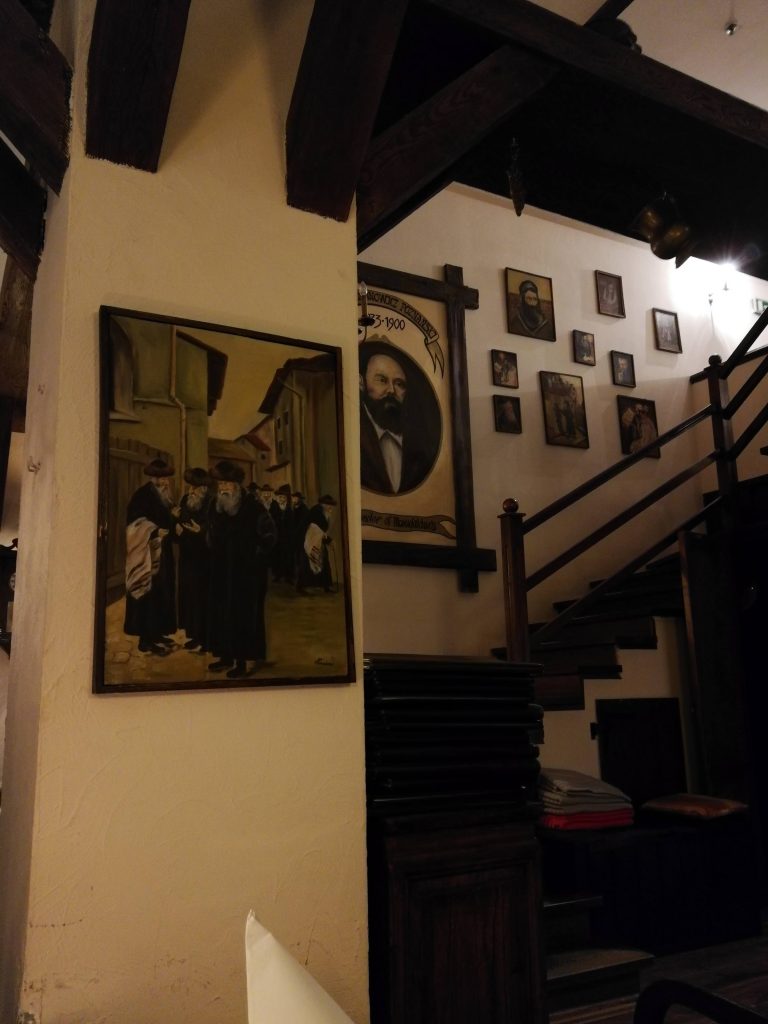
In the following months I had the opportunity to learn a lot more about the Ashkenazim and their origin. I found out about the difference between Ashkenazi and Sephardic Jews. I learned that the Ashkenazim migrated to the German lands after the Destruction of the Temple almost two thousand years ago. I read about that the Polish–Lithuanian Commonwealth gave them a shelter after they were no longer welcome in the Holy Roman Empire. I watched interviews by Ashkenazi Jews in Yiddish. I started learning their language a bit. I read books by Jewish writers. I walked around my city of Bedzin to find out more about its Jewish past.
As you may notice at this point, this is pretty much the same issue that the US has with African Americans. There is a fundamental problem of disinformation and ignorance in our systems and widely spread in our population. In Germany, we often see ourselves on our high horse of moral superiority, but in fact we are not any better. The only difference is that we can ignore this issue, because of the exceedingly small number of Jews living in our country nowadays. There are no protests and there will be no protests. They will not be able to get their audience as we do not see antisemitism as a big issue right now and because they are just too few people.
I therefore think that the most important action to take is informing yourself and then spread what you have learnt. This does not only make you aware of the problems that Jews still have to face nowadays, but this can also give you the opportunity to explore another completely different aspect of our culture. Personally, I can say that this was extremely rewarding for me, so that I think that it makes sense to share some of the best options to experience Jewish culture in Europe:
Read books by Jewish writers
For me, this was one of the most interesting things to do as some of our greatest writers are of Jewish origin. The aspect which makes them so fascinating to read is the constant duality that can be found throughout most of their works. The duality between longing for an own country and integrating into the local community brought up lots of thoughts on belonging, society, and humanity in general and how our social interactions within a given structure work. Some books I read that I can recommend you are: The Trial and The Metamorphosis by Franz Kafka, The Magician of Lublin by Isaac Bashevis Singer and Night by Elie Wiesel. The Communist Manifesto may also be quite interesting for some of you.
Watch movies or series dealing with this subject
As I am not the biggest film enthusiast on this planet, I did not really watch a lot, but I can still tell you about some. Personally, I watched The Promised Land directed by Andrzej Wajda, which tells the story of one Pole, one German and one Jew who live in Lodz. It depicts some of the social conflicts of this time, but also shows how this cultural melting pot made the city grow. Also, if you are interested in older movies, there are a lot of films from the time between the two wars as the Yiddish film industry was prospering during this period of history. Apart from that, there are also tons of modern movies or series, so if you are interested you will find lots of lists collecting the best ones out there right now.
Watch out for how you talk about the Israeli-Palestinian conflict
Okay, I am finally addressing the big elephant in the room. And I want to focus on how we as Germans should not talk about it. We are in a position of moral inferiority and we will probably still be for a very long time because of our history. This means that we should hesitate a bit more sometimes when we criticize Israeli politics. Israel is the most criticized country in Germany nowadays. Of course, there are a lot of points you can dislike about their politics, but are they really the worst country on this planet? Also, is not our moral responsibility turned upside down when we look at this fact? I therefore urge you to be more aware of how you talk about this topic and yes, there are really a lot of people who mix up criticism of Israel with antisemitic hate speech. However, this should not mean that you remain silent about these issues, just be aware of how you address them.
Visit Jewish parts of your city or go there while travelling
This was probably the coolest aspect of my exploration of this part of our European culture. Not only did I see lots of wonderful and extremely beautiful buildings, but I also tried amazing food. Seriously, Europe’s Jewish cuisine is crazy underrated. From kugel and babka in Poland, to flódni cake in Budapest and pizza dolce ebraica and crostata ricotta e visciole in Rome. For me as a cake enthusiast, the Jewish cuisine here in Europe is heaven.
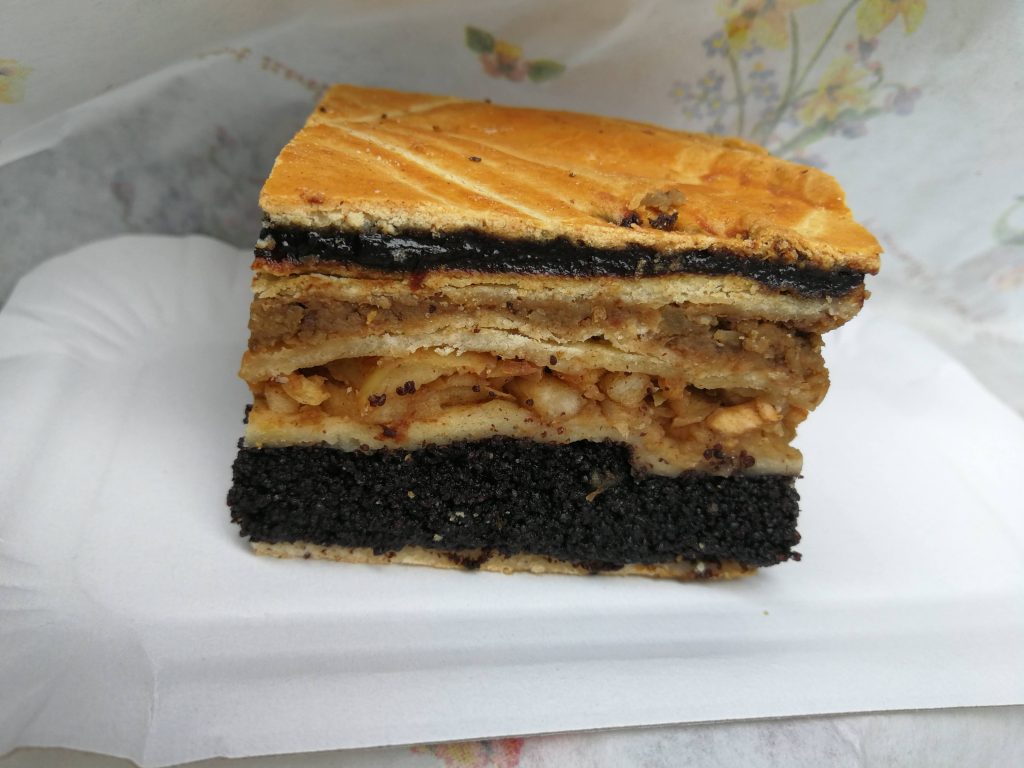
Before I get lost with these heavenly gifts, I will tell a bit more about what I found most exciting about visiting some former Jewish ghettos. The cool thing about this is that you can find such a place in every major city, so no matter where you go, you will be able to find something like that. And it is especially nice that there are always some common things but also some local aspects like different architecture or even a different language written on the walls such as Yiddish in Poland.
Visiting this part of several cities gave me some of the most interesting travel experiences. I got lost in the oldest Jewish ghetto of Europe, the one in Venice and I almost did not find my way out as my phone died, so that I was very close to missing my bus back to Poland. In Budapest I found my way to one of the magnificent ruin pubs and I had a remarkably interesting conversation with a Persian baker in the middle of the Jewish quarter. Moreover, the Jewish café of Bedzin, the city where I lived in Poland is by far the coolest place in town and I would have loved to go there more often. Eventually, I must say that seeing something familiar represented in every city with some local facets gave me a familiar feeling no matter in which country it was.
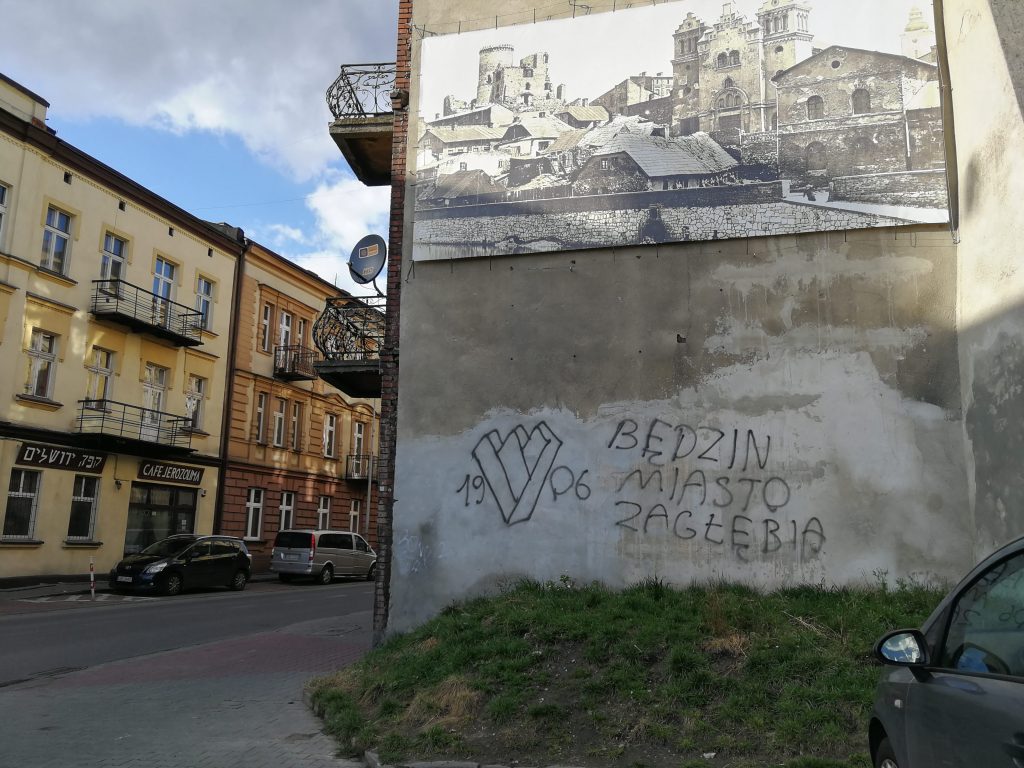
The Shoah
Even though I put the focus on the living of the European Jewish community in this article, it does not mean to care any less about the Shoah. However, it seems to me that the Holocaust is extremely hard to understand if we do not look at those who were murdered. It still is impossible to understand this systematical cruelty, but at least I would say that I now have a sense how much culture was burned through the chimneys of Birkenau together with the millions of people. Sometimes it makes more sense to look at one person, one life, to comprehend the millions.
When I visited Auschwitz-Birkenau last March I could not grasp a single thing. I was completely lost in wasteland. In every direction I was looking, only gray skies or burned soil. It felt like being in a vacuum of nothing, this is a place of death, and of death only. Towards the end of the tour, we visited the former “sauna”. What I saw there completely changed my perception of this place. There was an exhibition about the Jews from my town, Bedzin. The reason for this is that these were the only photos saved. They depicted wonderful scenes from Bedzin showing joyful and happy moments. And in this moment, I realized where all the life from Bedzin went to. Nowadays, it still is a dead city. Half of its population used to be Jewish. Almost nobody survived. These photos here and the memories of people are the only remnants of their lives and Bedzin as a livable city.
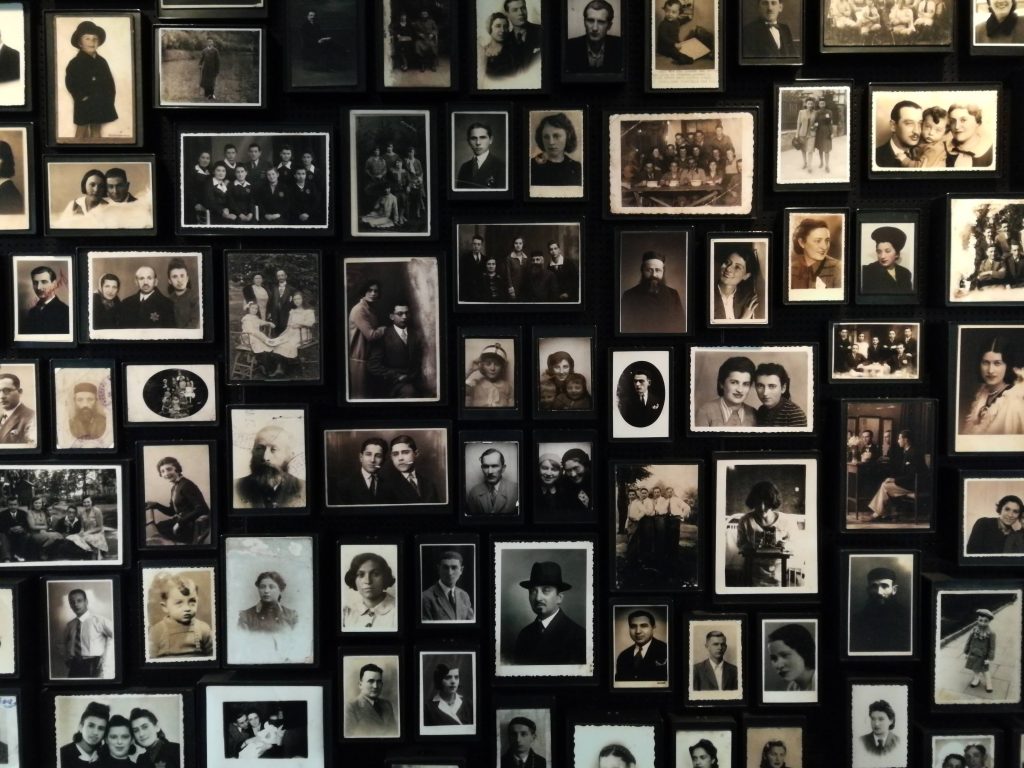
I hope that our perception of Jews changes soon, especially by learning about the Ashkenazim and by finally accepting them as part of our past. I hope that Jews will be able to live here someday without the necessity of protecting all their institutions and with this their lives. I accuse all of us of ignorance and complacency. I accuse us of not doing enough. I accuse us of seeing the victims of the Shoah as numbers, as stones just like how they are shown in our capital.
My hope is that we will be educated. My hope is that teachers will mention this topic more in our schools, no matter if we talk about history, literature, music, art, or social sciences. My hope is that our governments will change the curriculum to finally acknowledge our past. My hope is that the antisemitic propaganda can finally come to an end in Germany as its traces can still be found everywhere in our society. My hope is that one day, young people in my country will know more than just numbers and a single song.

